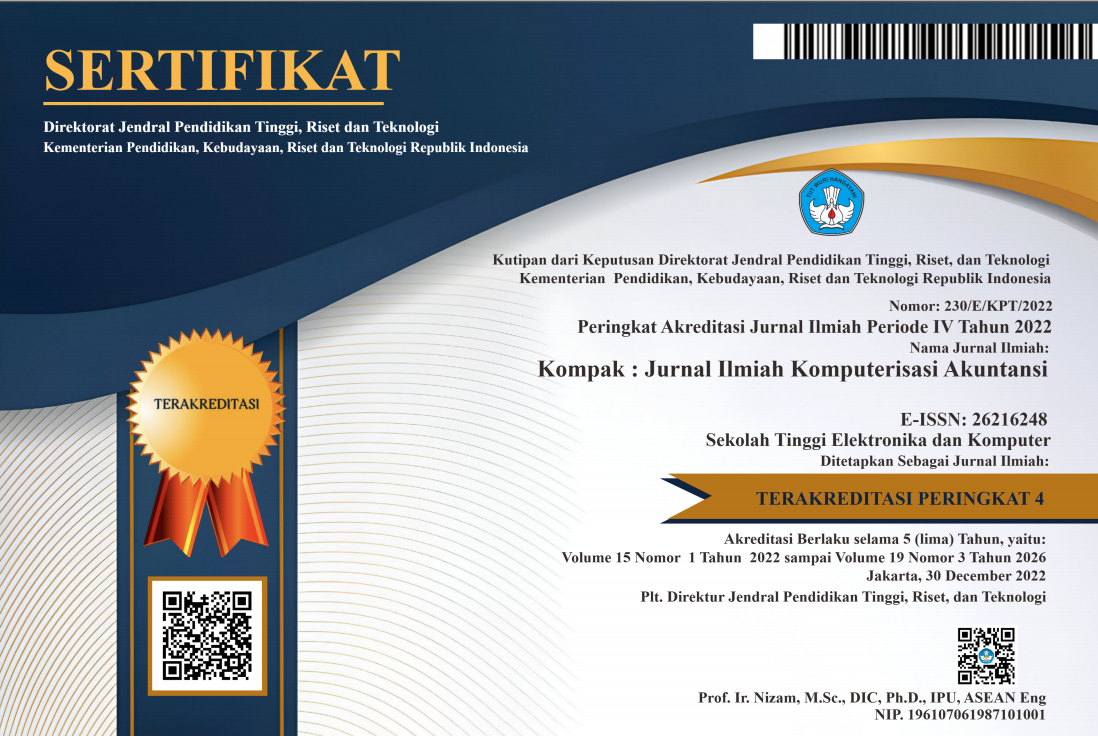Pengaruh Kompetensi Lulusan Berbasis Entrepreneurship Terhadap Kepuasan Pengguna Dan Daya Saing Alumni Sekolah Tinggi Ilmu Ekonomi Bima
DOI:
https://doi.org/10.51903/kompak.v17i2.2087Kata Kunci:
. Entrepreneurial Graduate Competencies, User Satisfaction, Competitiveness, Alumni, STIE BimaAbstrak
. The aim of this research is to determine the direct relationship between entrepreneur-based competencies on user satisfaction and alumni competitiveness. This research uses a quantitative approach method by distributing questionnaires. The population in this research is all organizations/agencies using STIE Bima alumni whose numbers are unknown. The sampling technique used was purposive sampling, namely 50 organizations/agencies that employ alumni, both private and government. The data analysis tool uses Smart PLS. The results of this research provide information that Interpreneur-Based Graduate Competencies have a direct influence on User Satisfaction and Competitiveness of Bima College of Economics Alumni
Referensi
[2] Agustin, Vony. 2012. “Kompetensi Lulusan Sarjana Srata 1 (S1) Psikologi dalam Menghadapi Dunia Kerja pada Mahasiswa PT “X”. Calyptra Jurnal Ilmiah Mahasiswa UNSA Vol. 1 No. 1
[3] Juwani, dkk. 2023. Peningkatan Kualitas Lulusan Sekolah TinggI Ilmu Ekonomi Bima melalui Trace Study. Prosiding Universitas Teknologi Sumbawa
[4] Wardani Krisma Widi, 2017, Pengaruh Kreativitas dalam Peningkatan Kompetensi Kepemimpinan Alumni Magister Manajemen Pendidikan Pada Kurikulum Berbasis Kompetensi, Kelola Jurnal Manajemen Pendidikan Magister Manajemen Pendidikan FKIP Universitas Kristen Satya Wacana jurnalkelola@gmail.com e-ISSN 2549-9661 Volume: 4, No. 2, Juli-Desember 2017 Halaman: 220-230
[5] Kotler, Philip. 2010. Manajemen Pemasaran. Edisi tiga belas Bahasa Indonesia. Jilid 1 dan 2. Jakarta : Erlangga.
[6] Amstrong, Gary & Philip, Kotler. 2012. Dasar-Dasar Pemasaran. Jilid I, Alih Bahasa Alexander Sindoro dan Benyamin Molan. Jakarta: Penerbit Prenhalindo.
[7] Khalid, S. and Bhatti, K. (2015) Entrepreneurial Competence in Managing Partnerships and Partnership Knowledge Exchange: Impact on Performance Difference in Export Expansion Stages. Journal of the World Business, 50, 598-608. https://doi.org/10.1016/j.jwb.2015.01.002
[8] Obschonka, M., Silbereisen, R.K., Schmitt Rodermund, E., & Stuetzer, M. 2011. Nascent Entrepreneurship and the Developing Individual: Early Entrepreneurial Competence in Adolescence and Venture Creation Success during the Career. Jour-nal of Vocational Behavior, 121–133
[9] Purnomo Margo, 2019, Kompetensi Entrepreneurial: Mata Rantai yang Hilang
untuk Menjadi Wirausaha Sukses, Makalah Jurusan Ilmu Administrasi
Niaga Fakultas Ilmu Sosial dan Ilmu Politik Universitas Padjadjaran
[10] Forsyth, John, & Boucher, Leah (2015). Why big data is not enough. Research
World, 2015(50): 26–27.
[11] Rasyid, Syaifudin A (2018), “Tracer Study Tentang Link And Match Alumni S1 Ilmu Perpustakaan Fah Uin Ar-Raniry Dan Dunia Kerja Di Wilayah Pantai Barat SelatanAceh”, Jurnal LIBRIA, Vol. 10, No. 1, Juni 2018..
[12] Sugiyono. 2016. Metode Penelitian Kuantitatif, Kualitatif dan R&D. Bandung: Afabeta















.png)



